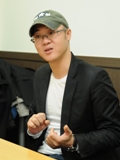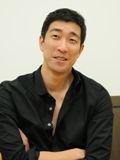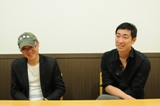2010.10.28
[Interviews]
Competition ŌĆ£The Piano in a FactoryŌĆØ Interview with Zhang Meng (Director) and Wang Qian-Yuan (Actor) (10/28)


©2010 TIFF
---Is it correct to understand that ŌĆ£The Piano in a FactoryŌĆØ is set in the first half of the 1990s in a north-eastern town in China?
Zhang Meng (Zhang): Time and place are not specifically set, but it is certainly set in the period when the heavy industrial area in north eastern China was hit by the policies of reform and openness in China. The state of society from the mid-1980s to the end of the 1990s is the backdrop to the story.
---Why did you choose this period? I believe it was after Deng XiaopingŌĆÖs famous southern tour of China in 1992 when reform and openness gathered pace.
Zhang:In 1992, I was a 17-year-old in north-eastern China. I remember that period in the midst of my adolescence vividly. Every family was hugely impacted by the waves of change. The north-eastern region has regained economic stability now, but it was unstabled in those days. I wanted to make a film about working class people.

©2010 TIFF
Wang Qian-Yuan (Wang): I am also from north-eastern China. I was still immature in those days, but the air of the period influenced the frame of mind significantly. People who are in an older generation than the director and I, for example my father, my fatherŌĆÖs friends and grandfather, they took the brunt of the change in society. But I was on the periphery and that period really interests me.

©2010 TIFF
---I wasnŌĆÖt quite sure where the film was going at the beginning, but as soon as they start building a steel piano, it became apparent that Chen and his fellows are all skilled workers. Seedy-looking men begin to glow as the story goes on to the second half.
Zhang: People in that generation are called the ŌĆ£lost generation,ŌĆØ referring to the workers who were thrown out of their jobs in the state factory. The men in ŌĆ£The Piano in a factoryŌĆØ are in a stagnant situation, but in the second half, they return to their disused factory. Through their almost eccentric attempt to build an all-steel piano, they rekindle their skills and rediscover the joy of working.
---Qian-yuan, you look sophisticated, but your character, Chen Guilin, is grouchy and selfish, and yet considerate of his family and friends. Through his limited facial expressions, his character was superbly expressed. Would you tell us about the acting plan and casting, please?
Wang:The director and I discussed the character and created it together. But I just know the air of the men from north-eastern China in those days. They were abrupt just like Chen Guilin. Even those in their 30s looked very mature and old, unlike nowadays. So I tried to recreate the people in my memory.
Zhang:Chen Guilin gradually took shape as I wrote the script. He is tall, slender, and the type of person who looks cold in winter even with a coat on. He is boorish but his gentle eyes give away to the audience that he is a good man. He is somewhat pitiful and everyone ends up caring for him. When his image was set to this point, I thought Wang is perfect for the role. He joined the Central Academy of Drama in 1993, and I joined in 1995. I think we must have been linked by fate.
Wang: Both of us are from the north-eastern region and the same school, and I can rely on him. Also, the directorŌĆÖs father was a film director, and my father was an actor (who makes an appearance as a seasoned engineer). We have a lot in common.

©2010 TIFF
---After your debut work, ŌĆ£Lucky Dog,ŌĆØ you made some documentaries. Do you think the experience is reflected in this film, for example in acting direction?
Zhang:I made two documentaries, and the experience was significant. In a documentary you have to calmly follow the subject. The experience helped me to recreate the recent past realistically. In addition to realism, surrealistic expressions were needed to portray the truth during that period exactly as I remember it. I kept it in mind to create the magic surreal atmosphere where reality and unreality coexist, for example, the scene where the snow falls in the factory. (note: His favorite films are Akira Kurosawa films and Italian neo-realism.)
---Chen builds a piano, initially for his daughter, but it gradually changes its nature to settle his own adolescence. The ending suggests ChenŌĆÖs fresh start while the chimneys, the symbol of the factory, are destroyed. Are these two linked in the theme of an end of a period?
Zhang: The society moves on at speed while Cheng and his colleagues try to remember the time when working class people lived proudly by building a steel piano. However, they know well that they cannot go back to those days. The collapsing chimneys represent the crumpling of their pride. They lose the factory where they spend nearly 40 years, and another change awaits them.
It is possible nowadays to face with a new phase while affirming the life to date. People face with the changes in the society, accept them and adapt to them. That is the theme of this film.
--- I am looking forward to the next film by you both. It would be fun to see Chen Guilin in the corner of another film, carrying on obstinately.
Wang: I hope to work with Zhang Meng again.
Zhang:Shall I add a scene for Chen Guilin on my next film?
(Interviewed by Yosuke Wakaki)
The Piano in a Factory
Film Information




